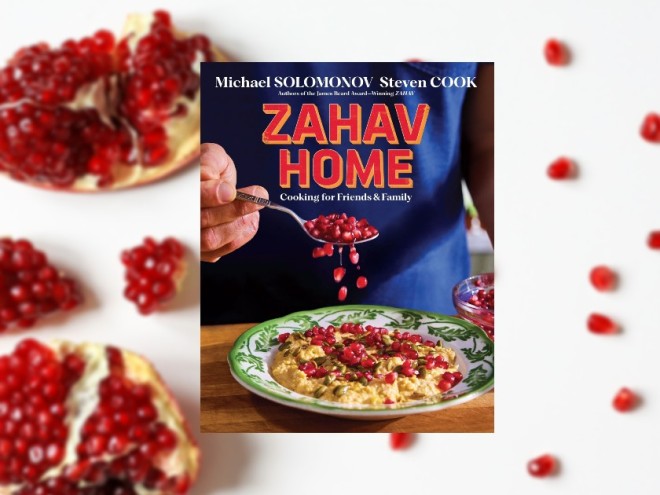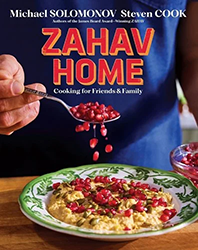Zahav: A World of Israeli Cooking is a book of recipes, personal stories, and the luscious photographs of beautiful food, an encyclopedia of Michael Solomonov’s idea of Israeli food: a mixture of Bulgarian, North African, Ethiopian, Yemenite, Georgian, “ all the cuisines that make up the country.”
Solomonov didn’t start out cooking Israeli food. He was a chef of Northern Italian food for Marc Vetri at Vetri’s Philadelphia restaurant and of French cuisine at the Striped Bass before that. In 2005, Solomonov went to work at Steve Cook’s restaurant Marigold Kitchen, where he discovered that the more his menu leaned toward Israeli food, the more passionate he was about cooking. Solomonov drew on his experiences as a short order cook in Kfar Saba and at a bakery making bourekas and rugelach, as well as on his Bulgarian grandmother Savta Mati’s cooking.
Solomonov sees his cooking as an opportunity to expose diners to a side of Israel that has nothing to do with politics. He is not religious, nor is his restaurant kosher, yet Solomonov clearly has respect for tradition. His restaurant, Zahav, doesn’t mix meat with milk and doesn’t cook pork or shellfish, according to Solomonov’s personal standard for qualifying as an Israeli food restaurant — though many of Zahav’s dishes will not be found on any menu in Israel since he uses fresh and local from the restaurant’s home in Philadelphia. When tomatoes are not in season in the area, for example, his Israeli salad uses stand-ins like mangoes, pickled persimmons, passion fruit, or even grapes.
Solomonov’s staples are his hummus, a smooth and creamy delight, and his recipe for techina — the “secret sauce” so important to Zahav that it takes up a full chapter of the cookbook.
Other sections include include recipes for pita, laffa, challah, and many vegetables stuffed with goodies. The chapter “Live Fire: As Close to Magic As I’ll Come” is about grilling meats and poultry; “Ben-Gurion’s Rice” includes freekah, Israeli couscous, pilafs, and even a kugel recipe; “Mesibah: It’s Party Time” is all about family-style cooking and eating, including shakshouka, whole roast chicken, Zahav lamb shoulder, Persian rice, whole grilled fish,leg of lamb, and coffee-roasted brisket; “Milk and Honey: A Glimpse of the Divine” feature Solomonov’s desserts, an ode to the chef’s self-proclaimed sugar compulsion. “In Israel, things get done over coffee and pastries,” he writes. “The Israelites were promised a land flowing with milk and honey. I’m just trying to do my part.” His Chocolate-Almond Situation recipe is both gluten-free and kosher for Passover, sure to take its place of honor upon Zahav readers’ seder tables.
This book includes a detailed intro, heartfelt acknowledgements, resources and index. Highlighted yellow boxes are scattered throughout, explaining exotic ingredients like dried limes, za’atar, harissa, baharat, amba, urfa pepper, arak, schug, hawaij, hilbeh, schmaltz, fenugreek, sumac, and other special spices provided in bulk from his favorite suppliers. Solomonov credits restaurateurs Terence Feury and Marc Vetri for teaching him both how to cook and the value of hard work. He also expresses his heartfelt love and appreciation for his business partner and best friend Steven Cook: together they have opened ten restaurants in a single decade. (A couple of new ones are in the works, including his first New York City outpost, a branch of his Philadelphia hummusiya, Dizengoff, serving hummus with pita and salatim.)
Although Solomonov was named the James Beard Best Chef of the Mid-Atlantic, he is a humble, sincere man in real life as well as in his writing. He adds his personal flavor of humor in sharing his knowledge of ingredients, preparation, and cooking. A mentsch with a colorful tattoo of Israel’s seven species — wheat, barley, grapes, figs, pomegranates, olives, dates — running down his arm, Solomonov does not glamorize the restaurant life, and is honest about the difficulties of culinary entrepreneurship and his personal life. His first cookbook combines the recipes behind Solomonov’s success with the reflections on the “improbable journey” that got him there, beginning with loss of his brother David, to whom Zahav: A World of Israeli Cooking is dedicated.
Miriam Bradman Abrahams, mom, grandmom, avid reader, sometime writer, born in Havana, raised in Brooklyn, residing in Long Beach on Long Island. Longtime former One Region One Book chair and JBC liaison for Nassau Hadassah, currently presenting Incident at San Miguel with author AJ Sidransky who wrote the historical fiction based on her Cuban Jewish refugee family’s experiences during the revolution. Fluent in Spanish and Hebrew, certified hatha yoga instructor.





